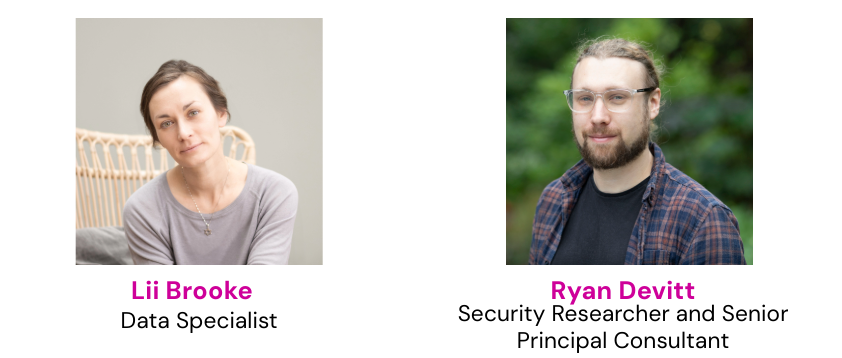Neurodiversity isn’t a buzzword – it’s how we make 6point6 inclusive for everyone
Sue Carruthers, Chief People Officer of 6point6 | Part of Accenture, reflects on the company’s drive to create the best place to work in the tech industry. It’s been a continuous journey of improvement for the business, championed by 6point6’s leadership team and the company’s employee networks and action groups. Lii Brooke, Data Specialist, and Ryan Devitt, Security Researcher and Senior Principal Consultant, share their candid experiences of being neurodivergent and what it’s like to work at 6point6.
'Inclusion and diversity are not a ‘nice to have’. It’s the only way to run an organisation that attracts brilliant people and provides them with the right environment to truly work at their best.'
Diversity and inclusion are still often seen as a side issue – something additional we need to do, rather than being deeply embedded in an organisation’s culture and ways of working. It’s estimated that around 20% of the population is neurodivergent and many either face barriers at work or are more likely to be unemployed. According to research, people with ADHD face an increased risk of unemployment and a staggering 80% of individuals with autism have been unable to secure long-term employment. Those who are in employment have expressed concern about disclosing their neurodivergence for fear of stigma (27%) or reduced career opportunities (24%) and around half of neurodivergent employees feel overwhelmed by distractions in the office.
The figures make for a sobering read and a reminder that we have a long way to go. Contrast this with the fact that we have a major skills shortage in the tech industry – one that will only become more acute as demand grows. A poll of organisations in 2022 found that 70% of them are struggling to fill IT roles and recruit great talent.
I’ve always been attracted to the tech industry for harnessing the disruptors and the innovators. Technology and innovation rely upon diversity of thought and new approaches to problem-solving. Difference should be what we strive for, not merely accommodated like a tick-box exercise. At 6point6, we’ve created an environment that’s about encouraging unique strengths, perspectives and skills. This is only made possible by valuing people from all walks of life, including individuals whose brains and ways of thinking differ from the neurotypical.
We’re building a better framework at 6point6 for hiring, screening and retention that goes beyond the physical and technological adaptations you can make to meaningfully improve accessibility in the workplace. Improving the social, behavioural and interactional elements is how we hope to create an environment that’s flexible enough to work for everyone. I am proud to have a culture where grassroots ideas are generated and implemented, driven by our dedicated employee networks who have helped us co-design many of our policies and processes.
Turning back to the tech industry, we need to come together and think about how we can adapt and create a more attractive environment where everyone can excel. Tech is the ecosystem where innovations and breakthroughs are transforming every aspect of our lives – it’s never been more critical to ensure that people with diverse perspectives and experiences are included in shaping that change.
‘Having people who see things differently and who don’t fit the mould disrupts that inclination to look in the same direction. That, in turn, has helped us provide the best service for our clients, boosting innovation while also increasing our employee engagement.’

In Lii’s own words – Data Specialist at 6point6
I joined 6point6 about two years ago and have recently been promoted to the role of data specialist. I’m currently working on a large central government project to improve the quality of a huge amount of data across different systems. I love working with complexity and supporting decision-making with data.
I am autistic and was diagnosed not long after I joined 6point6. What really struck me when I first joined was how independent I could be. I have a supportive manager who is not directive. I also get to choose how I work – something that is important to me. I firmly believe autism is a difference, not an impairment. Being autistic is an all-encompassing quality of my existence. There is no non-autistic me. I cannot imagine opting for a different body or mind. That would be somebody else. It has taken me a long time to embrace my strengths as well as my shortcomings.
In my job I can dedicate a lot of focus and cognitive energy to methodical tasks such as data analysis. I am also very happy in my own company and am good at working autonomously. But with all that positivity, there are struggles too. I am hugely grateful to have found a company where I can operate at my optimum.
‘I've heard people say to me: “We are all on the spectrum,” or “We are all a little bit autistic”. It does make me feel like I am not trying hard enough at life because, if most people function in situations that I find unbearable despite them being “a little bit autistic”, then why can’t I?’

In Ryan’s own words – Security Researcher and Senior Principal Consultant at 6point6
I’ve struggled with the difficulties associated with ADHD, such as inattentiveness and impulsivity, since I was a child. It wasn’t until after my diagnosis two years ago that I gained a better understanding of neurodiversity and how it affects me. Getting my diagnosis also helped me understand that my thought processes differ from a lot of other people. This means there’ll inevitably be things that I struggle with and certain tasks that I’ll find more difficult because my brain doesn’t work in a ‘neurotypical’ way. With the challenges also come many traits associated with ADHD that are a real benefit in certain scenarios. In my role as a cyber security researcher and security tester, my ability to hyper-focus means I can drill into problems at length. Spending extended periods of time within the details helps me to uncover things that others may be more likely to overlook.
Prior to joining 6point6, I found that I struggled to work within rigidly enforced structures, management styles or working patterns. Companies I worked for previously have tried to steer me towards roles focusing on project management but without giving me the right support. I now have a better understanding of my neurodivergence and have access to the tools I need to assist me. It helps that 6point6 applies a strengths-based approach and provides an environment that allows individuals to work in a way that suits them.
My top advice for anyone wanting to create a more inclusive environment is to start from a place of empathy. No matter whether someone is neurodivergent or not, spend time understanding what works for that person. Lead with their strengths and set them up to succeed, rather than prescribing a particular way of working and enforcing the adoption of a certain approach which may not work for them.
‘I enjoyed how the interview process at 6point6 differed, as it provided the freedom to adapt and present knowledge in a way that worked for me. This facilitated an environment that meant I was able to demonstrate the best of my competencies, interests and abilities.’
Interested in joining a company where you can be your authentic self? Visit our career page or contact a member of our recruitment team.
About the authors

Lii Brooke is a data specialist in our data practice, where her diverse business knowledge and experience allows her to excel in her role working with central government big data. Outside of her work at 6point6, she is a qualified counsellor who is passionate about supporting autistic adults. Ryan Devitt plays a key role in 6point6’s cyber security team, leading security research for central government clients. Ryan takes an active role in raising awareness of ADHD and recently featured on a neurodiversity panel organised by the internal Equity, Diversity and Inclusion Group at 6point6.